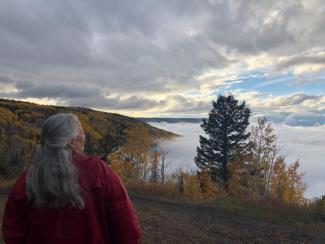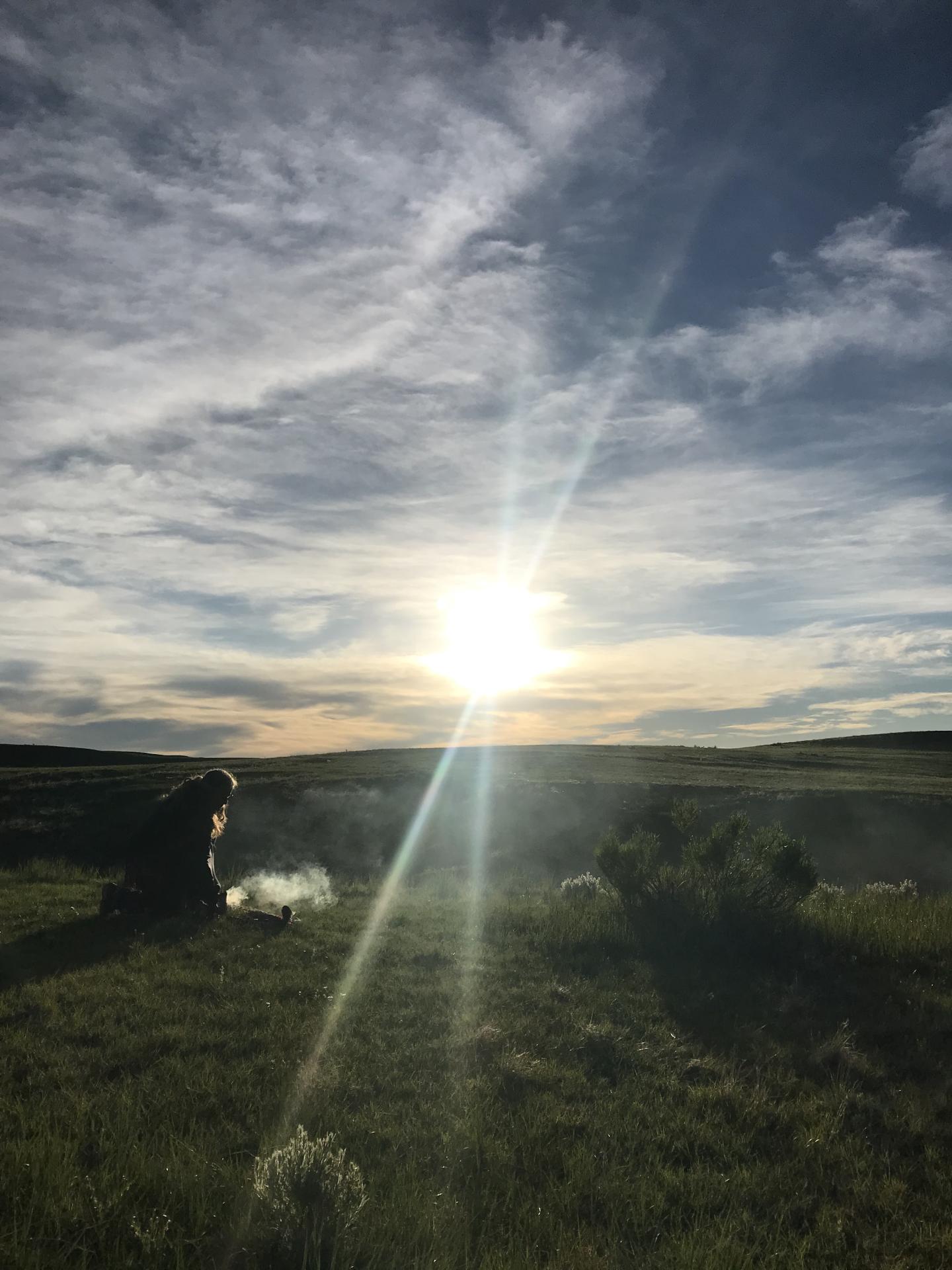Our Breath of Being: Indigenous Living through Storying Traditions
27 Januari 2024agnes

By Dr. Doreen E. Martinez (Mescalero Apache)
I think back to when I was young, and I am trying to recall the time I learned what respect meant, what respect looked like, how I could offer it. I am pulled back to a sense of presence, a way of being that my parents offered, that I saw or felt my siblings doing, or how it resided in our house and the way my parents welcomed all other kids in our neighborhood into our home. Our home being the ‘poorest,’ however, our home was the place where everyone was fed.
When I try to remember those times, I am often taken to other lessons I was offered. Lessons of humility stand out. Lessons of responsibility resound and ring. Teachings of reverence, those sacred ways of giving thanks, being in awe and understanding life spirit, teachings of giving keep coming back. I remember kindness, caring, and laughter swirling, ever-present. I smile as I recall being teased. I hear my relatives: the birds chirping, dogs barking, cats meowing, and hamster wheels turning.
I continue to hear those lessons and I try to share them, as this is one of the lessons: the responsibility to share. These lessons and these teachings are our oral traditions, the formal and the informal. They are traditions of awe, wonder, and beauty; traditions of relationships and responsibilities. They are oral in spoken words as well as in songs, in utterances, and the sounds of sight and sounds of thoughts and feelings.
Oral traditions in Indigenous Nations and societies have existed since we have existed, since time beyond what we can remember. Oral traditions offer values, beliefs, and practices that uphold and reinforce how to be, why we are here, and our responsibilities to all our relatives, humans being the two-leggeds, all our relatives being the winged ones, the creepy crawlies, the four-legged, the storm people, and the earth and sky, to name a few others.
Oral traditions reinforce our presence, our sense of being as Peoples and Nations, as the collective, and as societies. They offer insights from our animal relatives and all of Earth’s elements. They are bridges to our ancestors. Our traditions remind us of the Earth’s beauty as well as its purpose and expectations of us. These traditions speak to our futures. The traditions come as stories, where storytellers carry and offer traditions as performances and engagements to reinforce and bring new values, beliefs, and practices of Indigenous traditions, Nations, and Peoples.
Oral traditions are about reinforcing relationships with the young and the old, the individual and the group. Indigenous traditions are about relationships with our ancestors and responsible relationships with our futures. Indigenous storytelling pays attention to the relationships of time, seasons, and cycles. These are relationships of thanks, reverence, and respect. It’s the relationship of the tease that fosters lessons of humility. It’s the relationship of giving thanks as the sun rises, for that is a relationship with blessings and learning how to welcome the new day. It is these relational premises that infiltrate a tone, tenor, and set of obligations to traditions, ways of being, and commitments to the land and our futures.

Oral traditions are practiced and understood through our senses, born, shared by, and remembered in the very sinew of our bones, molecules of our hair, and beats of our hearts. Oral traditions are core pieces of Indigenous Peoples’ ways of being as peoples of the land and peoples of the water. Storytelling connects the heart and mind that hears the storm people, the furry ones and winged ones, that smells, tastes, and knows lessons and living.
Oral traditions allow a deep understanding, a consciousness, that can be heard through tiny squeaks as much as booming thunder. Our oral traditions wake us, nurture us, celebrate us, and forever our kin. Because stories are about all of us, the full collective, we repeat practices and give in honor to their messages. Oral traditions affirm and support us as we grow, as we fall, and as we breathe. They come from various peoples and sources all to know and come to know what it means to be Indigenous and, often, what it means to come from a certain Nation, specific Tribe, or village.
These traditions speak of being Indigenous as a vibrant expression of identity, which is stated in reverence, worn expressively, and reveals the significance and personal connections about each of us collectively. These expressions of identities, badges of pride, revelations, and attachments, all come to be seen/known through storytelling from the collective sphere of existence.
Indigenous traditions offer insights into sharing and redistribution as well as acts and presents of reciprocity. All of these are performances and actions of individuals for the collective. Teasing, humor, and humility are fundamental to our traditions as they serve to keep us in the collective instead of focused on the individual. Teasing also brings laughter and joy and beauty. Humor reminds us of the Earth’s wonders and the grace in relationships.
Oral traditions must have tellers, tellings, listenings, and listeners. Imagine these in a circle that reinforces our remembrance. When we pay attention to those remembrances, our tellers will tell in ways that listeners listen. Our tellers will raise a voice, soften a knee, smile, and wipe a tear while telling. They will speak softly, they may sing, and invite listening. Our tellers will rehearse for our listenings. The listeners can become tellers, and the tellers, listeners. Indigenous traditions and lessons are ontologies—our nature of being, our essence, and our origins.
Collectively, I know the tellers and tellings have shaped my understanding of their stories of our traditions, lessons, and lives as much as I shape the presentation of their story. When the story coexists in these multiple truths, we are gifted with the potentialities of pleasure, beauty, power, and excellence. It is our presence. These traditions and this presence can be our resistance.
Indigenous traditions must have expectations, protocols, and purpose. Our oral traditions’ ethics serve various ways of knowing, how to retrieve and access those knowings, who will share those knowings, how and when we offer those knowings, and how we hold each other accountable for those knowings. Ethics, standards, or codes of oral traditions are driven by our values and beliefs. We must act upon and weave in principles of the collective that respect our histories and our ancestors, live in the present, and prepare our futures. These ethics promote kinship and relationality while keeping grounding respect, responsibility, and reverence.
I am concerned when I think of others’ understanding of our oral traditions. They frequently refer to our traditions as ‘less than’ because they are oral, or told with our voices or other expressions; that because they are oral they are less powerful or somehow less relevant. Yet, the power of our traditions are how long they have existed, recalled since time immemorial.
Indigenous storytelling are Indigenous practices of producing and sharing knowledge. Tellers have decades of experience as listeners. There are layers of tellings that give depth and breadth that may rarely be understood. It is common for oral traditions to be shared over days or even weeks. There are stories, traditions, told yearly. These traditions and lessons are shared generationally, across and within kinships.
In our oral traditions, we know there is power in giving, power in receiving. We know that once a story is put out there, you can try to call it back, but it is too late. We know words create reality and truths. We know that once a story is told, it is loose in the world. Oral traditions are our breath of being. We exist, we breathe through stories and traditions. We come to know ourselves, our teachings, and our Nations, Tribes, and villages through these traditions. We come to know all our relatives, all that they teach us. We come to know values and ways to show up in the world. We see gifts and are blessed with presence.
Presence is given through sounds, through tellers, and through those traditions. We speak through a deep coexistence of remembrance and resistance, which echoes through storytelling. It is our ancestors’ echoes, too.

—Dr. Doreen E. Martinez is Mescalero Apache and Pennsylvania Dutch. She has a PhD in Sociology ad focuses on how Traditional Knowledge, the grounding and inspiration of our lives, is engaged and practiced every day. She is the fourth of five children and was the first in her family to wander, break ground, gain access, and pursue U.S. formal education. She is an avid advocate of alliance building and promoting justice.
